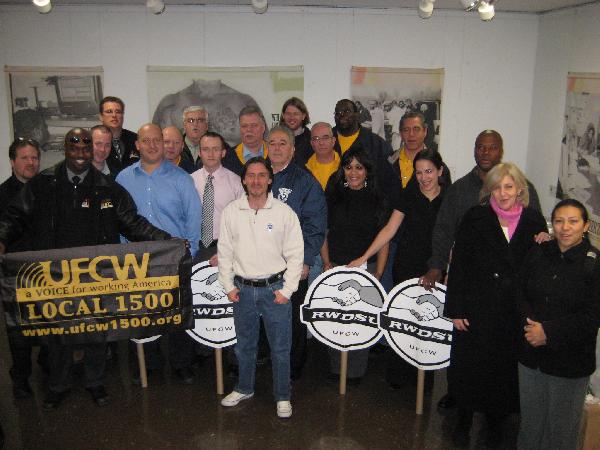Over 600 workers employed at Rite Aid's giant distribution center in Lancaster, California, sent their representative to attend the company's emergency shareholder meeting in New York City on Tuesday, December 2.
With the company's stock price hovering at less than 50 cents, and problems plaguing Rite Aid's supply chain serving hundreds of stores in the southwest, workers expressed "serious concerns about the focus and execution of Rite Aid's top management team."
Rite Aid management is blaming its troubles on the economy, but employees offered a different perspective.
"When you work inside a critical point in the supply chain, you can tell if management is really focused on running things efficiently and motivating everyone to work together as a team. Right now, that's not happening at Rite Aid from what we can see." said Carlos "Chico" Rubio who works at Rite Aid's modern million-square-foot distribution center in Lancaster where container-loads of products arrive each day from the Port of Los Angeles and are quickly distributed with just-in-time precision to more than 500 Rite Aid retail stores throughout the southwest.
"The good news is that we've got talented employees who want to be part of a successful solution. But we're missing that opportunity now because management can't seem to focus on solving problems and working together with us as a team," explained Mr. Rubio, who offered three suggestions at the shareholder meeting:
Rubio invited CEO Mary Sammons to visit the Rite Aid's distribution center in Lancaster to meet with employees, explain the company's goals, and encourage problem-solving.
Rite Aid executives should consider limiting their compensation to reasonable multiples of what workers earn, and keep executive pay more in line with performance.
Rite Aid management should abandon its anti-union "we know what's best for you" philosophy, and focus instead on building cooperative relations with its employees' unions.
Morale among Rite Aid workers nationwide has suffered because top management has been taking huge compensation packages despite a 95 percent decline in share value since June 2007. Top executives took over $18.2 million in total compensation in FY 2008, including more than $3.5 million in cash bonuses related to the acquisition of the Brooks and Eckerd drug store chains, a decision some analysts consider to have been a costly mistake.
At Rite Aid's distribution center in Lancaster, workers have struggled with other examples of bad management that surfaced soon after employees expressed interest in joining the International Longshore and Warehouse Union (ILWU). The ILWU already represents dockworkers at the ports who handle Rite Aid shipping containers that are offloaded from ships and then transported to distribution centers, including Lancaster. In March 2008, the distribution center workers voted to form a union, overcoming an expensive and vicious anti-union campaign waged by Rite Aid management. The company engaged in a host of illegal labor activities, including disciplining, harassing, and firing union supporters. The company's behavior was so egregious that the National Labor Relations Board prepared to try Rite Aid on 49 violations of federal labor law. Rite Aid executives chose to settle the charges rather than defend their costly and illegal campaign against employees having a voice at work.
Management's aggressive interference did not end after the Lancaster workers voted to form their union. Rite Aid has continued a costly and intense anti-union campaign that has included harassing workers, issuing warnings and suspensions to union supporters, and firing at least six union supporters on flimsy pretexts. Charges alleging new unfair labor practices, related to the company's failure to bargain in good faith, are pending.
"Rite Aid is wasting precious time and money on their anti-union campaign when all of us should be focused on getting this company back on the right track," said Mr. Rubio. "Management should be working with us, instead of against us, to help this company succeed."
Prior to attending the shareholder meeting, Mr. Rubio met with the AFL-CIO and other unions representing workers at Rite Aid. At the meeting, an AFL-CIO representative announced that a special briefing was being organized for industry analysts and investors in early 2009.
Trustees of union health and welfare funds, which have an important say over lucrative contracts with pharmacies including Rite Aid, are expressing concern about the company's poor labor relations record. At a recent Employee Benefits Conference in San Antonio, hundreds of union plan representatives received detailed information about Rite Aid's ongoing labor dispute in Lancaster.
In addition to financial and labor problems, Rite Aid has been entangled in a number of consumer fraud cases. The company has defended itself against a slew of consumer fraud allegations during the past decade, and is now in litigation with the New York Attorney General. Last summer an investigation by the Attorney General found that 112 Rite Aid stores had carried or sold expired products. The announcement of the New York allegations came as Rite Aid was settling a similar case with Attorney General of New Jersey.
A more detailed report documenting Rite Aid's mismanagement and attempts to suppress workers' rights may be obtained by contacting Rand Wilson at the above number or by email at
rand@mindspring.org.
The International Longshore and Warehouse Union unites more than 45,000 workers in over 60 local unions in the states of California, Washington, Oregon, Alaska and Hawaii.

